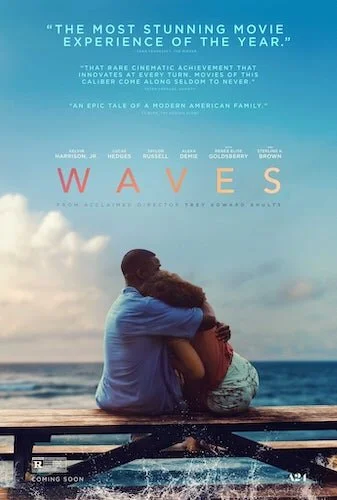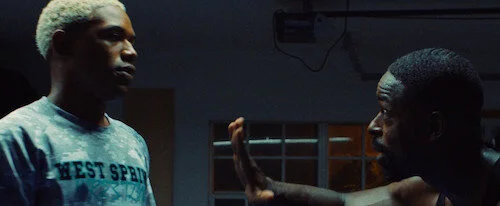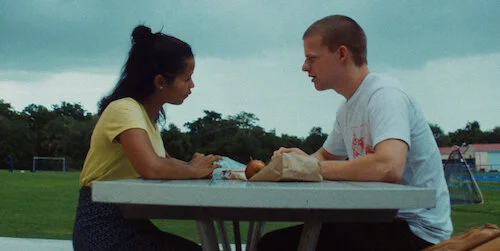Waves
It's never too late to discuss Waves, because this film continues to make a splash amongst film critics well towards the tail end of 2019. It is easy to see why. It is an aesthetic wonderland full of the best cinematography of 2019, and music for the ages (some composed by famed duo Trent Reznor and Atticus Ross, some popular tracks within the Pitchfork readership crowd). Based on sound and vision alone, Waves is exemplary. As a story, Waves is tethered by its reliance on the gravitas of a situation, rather than the semblance of how a narrative should be formed.
This is the anticipated follow up to It Comes at Night for filmmaker Trey Edward Shults, with a need to capture the blur of adolescence. This fog occurs during crisis, highs, glory and agony. Parts of Waves are shot in a 1:1 ratio, creating visual suffocation in the form of an Instagram story video mode. Then, the film explodes into a widescreen format, as if you can't take in enough of the visuals. All of the visual exploration (swirling pans, neon lights, radiating lights, major use of blurs) is that lingering feeling everyone that watches Waves has.
Tyler and his father sparring, as training for an upcoming wrestling match.
This supersedes the story, which is solid in foundation but a little misguided in execution. We follow Tyler through his ups and downs as a high school senior, being pushed to the limit by his father and society. We get up close and personal with him, by being right beside him for at least half the film. Waves then jumps into the major perspective of his sister Emily, and follows a similar game plan. With the Williams household dealing with a major tragedy, Waves captures the swirling feelings of loved ones in crisis mode. However, there is just enough abandonment narratively to render the film an incomplete experiment. We are taught about being there for family even at their worst, and yet Waves ends just when some of the characters needed us the most? There is only slight resolution, in a film that uses so much time to explore the tiniest of intricacies within life. It's enough of a burn to turn a glorious statement like Waves into a less impactful final result.
To overcome the gaps in the story, we have a perfect cast, particularly the Williams family members themselves. Kelvin Harrison Jr. keeps so many secrets as Tyler, and you know he is vaulting these confessions in out of fear of not being good enough. When he cracks, he gets extremely messy. Sister Emily is played fantastically by Taylor Russell, as she is shyly carrying the burden of every single other family member, in an effort to keep everyone together (at least in her heart). Renée Elise Goldsberry is the loving Williams stepmother that plays the calmer scenes safe, but her depressing moments with hyper realism (maybe those calm scenes were her way of brushing off underlying problems?). Finally, Sterling K. Brown as the blunt patriarchal member of the Williams family continues his hot streak of blistering performances one after the other. Here, he is difficult, because he wants his loved ones to succeed. When success is a distant memory, he breaks, feeling like he wasn't good enough as a dad.
Emily on a date, pushing herself past her trauma.
As a audio-visual medium, Waves is every bit of that thrill that you've been reading about. Although it cuts a few corners, it's impossible to not be engrossed by this film. You may feel a bit empty, but them's the breaks with a high that doesn't last forever. Watch Waves on a literary level, and you're watching Waves wrong. Just let it soak you up, with its Animal Collective, Kanye West, and SZA jams. Fall backwards into the cascading colours. Ingest all of the riveting performances. You'll be in awe for two hours.
Andreas Babiolakis has a Masters degree in Film and Photography Preservation and Collections Management from Ryerson University, as well as a Bachelors degree in Cinema Studies from York University. His favourite times of year are the Criterion Collection flash sales and the annual Toronto International Film Festival.






